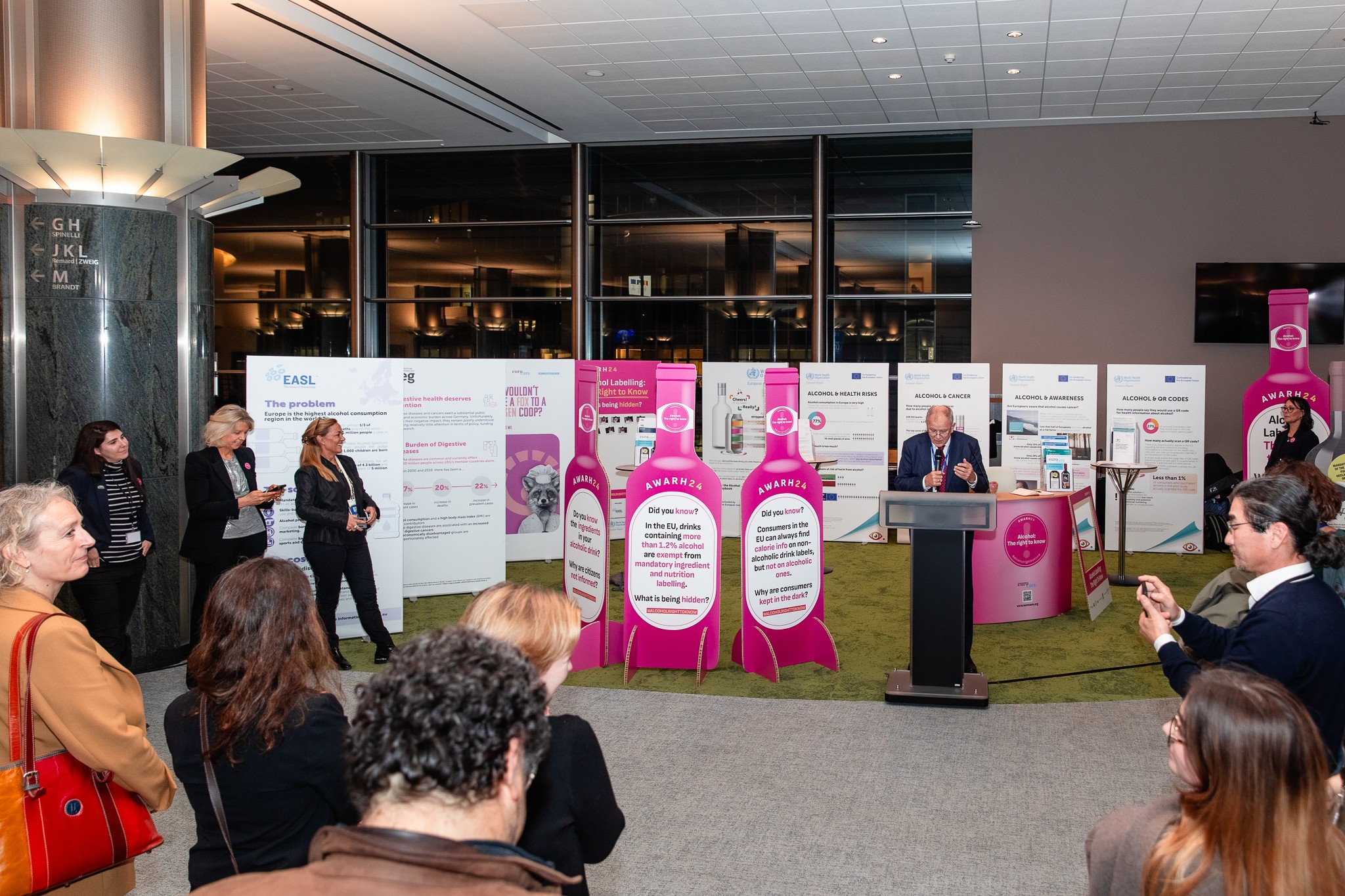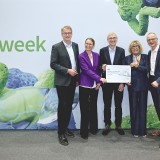- UEG is a member of the European Alcohol Policy Alliance (Eurocare), the only alliance of national, pan-European and international NGOs working exclusively on EU policy analysis and advocacy linked to the reduction of alcohol related harm in Europe.
- Alcohol labelling refers to the indication of the energy value, full nutrition declaration and list of ingredients on the labels of alcoholic beverages. Alcohol health warnings refer to labelling requirements designed to inform consumers about the risks associated with alcohol consumption (e.g. “alcohol causes cancer”). The Beating Cancer Plan roadmap includes policy initiatives related to both. The FIC Regulation revision only includes alcohol labelling.
- The WHO European Region has the highest proportion of drinkers and the highest intake of alcohol in the world. Consumption of alcohol is a preventable risk factor that can cause premature death and over 200 diseases including seven types of cancer, neuropsychiatric disorders, cardiovascular diseases, cirrhosis of the liver and several infectious diseases.
- Did you know? In the EU, drinks containing more than 1.2% alcohol are exempt from mandatory ingredient and nutrition labelling? What is being hidden?
- Did you know? Consumers in the EU can always find calorie info on non-alcoholic drink labels, but not on alcoholic ones? Why are consumers kept in the dark?
- Eurocare’s Alcohol Labelling & Health Warnings Position Paper describes the simple and straightforward stance of our network: alcohol products should provide nutritional and ingredient information in line with other products sold to consumers, and consumers should be informed of the most important health risks of products which have a substantial impact on their health. The alcohol industry is opposed to providing information to consumers and are employing various strategies to avoid it, such as denying and discounting the effects of alcohol, deflecting discussions and delaying progress towards labelling regulation. Citizens rightly expect to see information relevant to their consumption decisions on the product.
- In 2021, The European Commission's Beating Cancer Plan made a "political commitment to leave no stone unturned to take action against cancer". As part of this commitment, the Commission promised to propose an amendment to the Food Information to Consumers (FIC) Regulation (EU) 1169/2011 to mandate ingredient and nutritional labelling on all alcoholic beverages by the end of 2022. However, the proposal was not released during the previous Commission’s mandate, and both EU citizens and MEPs are still waiting for action. In addition, a separate initiative to introduce health warnings on alcoholic beverages was promised by the end of 2023, but there was also a delay with the health warning proposal.
- The European Association for the Study of the Liver (EASL) Policy Statement Reducing Alcohol Harms 2023 - including recommendations for policymakers.
- Research reports “Alcohol and the Brain”
- Health warning labels on alcoholic beverages in the WHO European Region in 2024

Tuesday 3 December 2024, marked the launch event of the European Awareness Week on Alcohol Related Harm (AWARH), hosted by Member of the European Parliament (MEP) Vytenis Povilas Andriukaitis, former European Commissioner for Health and Food Safety.
This year’s campaign focuses on a pressing question: why are citizens not provided with basic information about what is in their alcoholic drinks?
Citizens Want Basic Facts
A European Commission consultation found that over two-thirds of participants believe that alcoholic beverages should have ingredient and nutritional labels. Current voluntary self-regulation by the alcohol industry has failed to address this need, leaving consumers without the essential information required to make informed choices about their health and well-being. Citizens do not want hidden information—they want basic facts.
Health implications of alcohol consumption
Alcohol has a significant adverse effect on health in the EU - it is a causal factor for more than 200 diseases, health conditions and injuries, including seven types of cancer, obesity and cardiovascular diseases. It is responsible for almost 1 million deaths in Europe each year. Furthermore, alcohol exacerbates existing health inequalities, with people from lower socioeconomic backgrounds experiencing higher levels of alcohol harm. There is no safe level of alcohol consumption, with even small levels increasing the risk for disease and cancer.
About the Campaign
The 2024 AWARH campaign, “Alcohol Labelling: The Right to Know,” highlights the urgent need for mandatory ingredient and nutrition labelling on alcoholic beverages. The 2024 Awareness Week on Alcohol Related Harm campaign is organised by the European Alcohol Policy Alliance (Eurocare), EuroHealthNet, European Association for the Study of the Liver (EASL), United European Gastroenterology (UEG), IOGT-NTO and Green Crescent, in collaboration with the World Health Organisation Regional Office for Europe. The European Alcohol Policy Alliance (Eurocare) is the only alliance of national, pan-European, and international NGOs dedicated solely to EU policy advocacy and analysis aimed at reducing alcohol-related harm. Members engage in advocacy, research, public information, and community-based services. Our mission is to promote policies that prevent and reduce alcohol related harm, emphasising the message that "less is better" regarding alcohol consumption. Eurocare represents 56 non-governmental and public health organisations across 19 European countries.
For the occasion, an official launch of the campaign was held at the European Parliament on the 3rd of December. The campaign’s exhibition remains open during EP office hours until the 6th of December.
-
Notes to Journalists
-
Contact
If you have any questions, please contact Anna Carboni, Public Affairs & Advocacy Manager at UEG.
Email: [email protected]
Phone number: +43 699 1997 16 74




Please log in with your myUEG account to post comments.